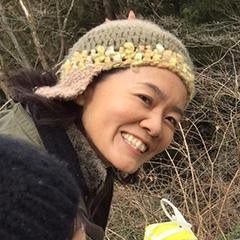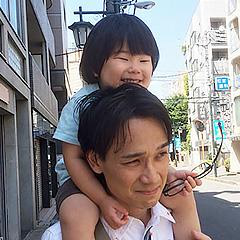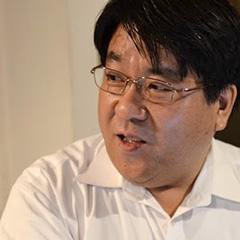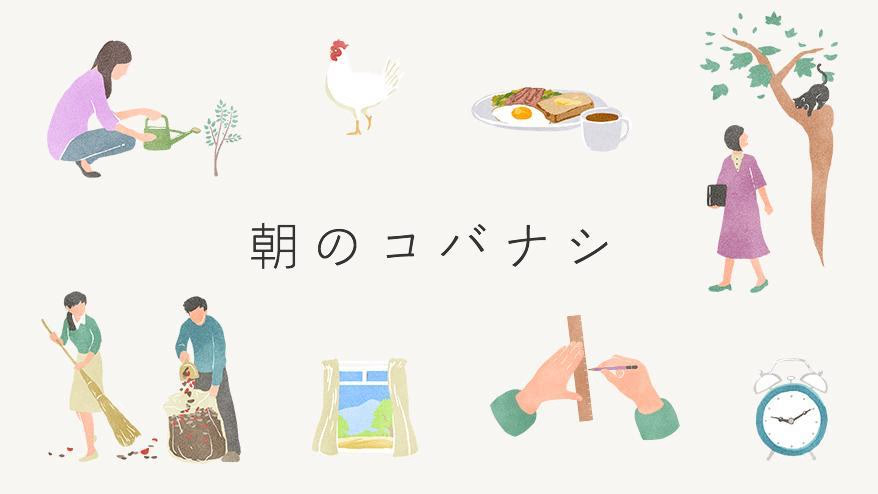Autumn is a season of harvest and appetite, a wonderful season.
The nearest stations to Monosus are Yoyogi, Minami-Shinjuku, Shinjuku, etc., but on a sunny day it can be fun to get off at a slightly different place than usual and take a walk to work.
Feeling the autumn breeze as we arrived at the Yoyogi office, we warmed up by listening to the "Quote of the Day" during the morning assembly. A day at Monosus begins with a little chat between executives, department heads, and leaders, who take turns each day.
This month we will be introducing a little bit of it on the Monosasu website.
The guests will be Executive Vice President Nagai, Design Department Manager Onogi, and Creative Department Manager Kamii.
So, let's begin "Quote of the Day"...
The past is our property

- Presenter
Tomoko Nagai (Executive Vice President)
I had the opportunity to think about how to build a career, and I realized that I was originally a programmer, and then I worked as a director and supported project managers, and have done a variety of other things to get to where I am today.
Then, I suddenly thought that this is similar to the Fibonacci sequence.
The Fibonacci sequence goes like this: 1, 2, 3, 5, 8, 13, 21, 34, 55.... The next number is the sum of the previous two numbers, and when you repeat 1+2=3, 2+3=5, 3+5=8..., there comes a time when the numbers grow exponentially. In fact, this sequence of numbers has something in common with natural phenomena, and although it accelerates suddenly, it's actually surprisingly easy to do.
I wonder if it would be great to build a career like this.
Our company also has many employees who transfer from other industries, but just because it's a different industry doesn't mean their previous skills aren't useful. For example, people who have worked in the customer service industry are very good at interacting with customers, and there are many areas where they can use their previous skills.
How can you use the things you naturally acquired in your previous job in your current job? Instead of cutting off your past self, think about whether something you cultivated back then can be useful now. By doing so, you can create your own original value.
Because of the experiences I have accumulated in the past, I have ways of thinking and the skills I can demonstrate that those who grew up in the same environment don't have. I hope you think about your career in this way.
A cause is a cause, isn't it?

- Presenter
Yu Onogi (Director of Design Department)
I was reading the best-selling book "The Courage to be Disliked " a few years ago, and I found the ideas of "causation" and "teleology" quite interesting. In contrast to causation, which says "there is a cause, and then there is a result," teleology says, "first there is a purpose, and then we create a reason to fit that purpose."
For example, in a situation where one is withdrawn,
Causal reasoning comes first, such as "I can't go outside because of past trauma," whereas teleology comes first, such as "I don't want to go outside, so I'm traumatizing myself with past events."
There is no cause and there is an effect,
The idea is that emotions and actions are created with a purpose in mind.
I come from a science background and have lived in a world of "cause → effect," so the idea of it being reversed was shocking to me. It made me realize that what we perceive as "A therefore B" might actually be different.
People who are angry for some reason may not be feeling angry because of the true cause, but because they want to make the other person submit. (So even if you solve the cause, the anger will not go away.)
When we are asked to do something unreasonable at work, we tend to say, "I can't do it because I'm busy right now," or "I can't do it because of ____," but if it's a job that we really want to do, we should be able to do it somehow. I wonder if in these cases, too, we have a purpose (whether we want to do it or not) first, and then we make up a reason.
This book is based on Adlerian psychology, but I believe that learning about different ways of thinking can change the way you perceive things, so if you're interested, I recommend you read it.
Follow someone's thoughts

- Presenter
Masayuki Kamii (Creative Department Manager)
I'm sure you've all heard of the word "debate," but recently it seems to be perceived as a "technique for defeating your opponent" or a "skill for getting your point across."
Originally, a debate (educational debate) is when people split into "affirmative" and "negative" positions on a certain topic and argue the superiority of their own arguments. Which side you are on has nothing to do with your personal beliefs, so you can set aside what you think inside and learn the skills to explain the arguments of the side you are assigned to to the other person.
It is important to explain your opinion logically, step by step, as to why you have arrived at a certain opinion, which is completely different from just asserting your own way of doing things. In other words, it is a "technique for communicating," not a "technique for following through."
So, once you have acquired the skills to communicate logically, I think you will then be able to do the opposite and think about how the other person arrived at their opinion.
In work, you interact with people from all walks of life, so there are probably many times when you don't agree with them. You might feel like just insisting on your opinion, but in those situations, it's important to think logically about why the other person came to that conclusion.
I believe that by unravelling the other person's thinking step by step, you can find unexpected ground to land on and have a fruitful discussion.
Well, have a great day today.
Our careers, causation and teleology, tracing the thoughts of others. We have a selection of "Kobanashi" that are perfect for the autumn of contemplation.
So, what kind of stories will come out tomorrow?
It's so much fun.
Well, have a great day everyone today.

